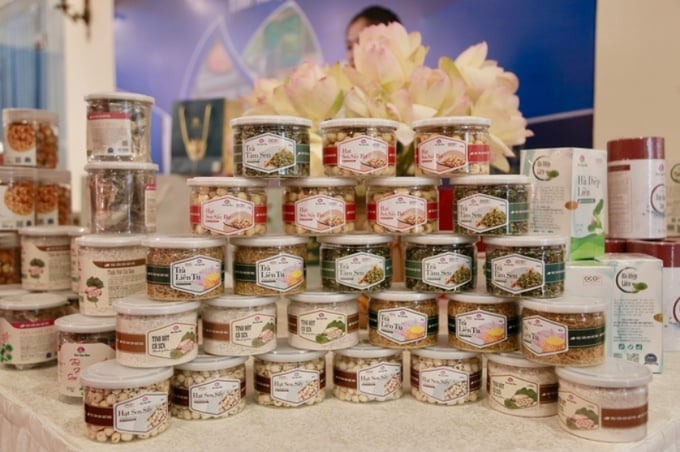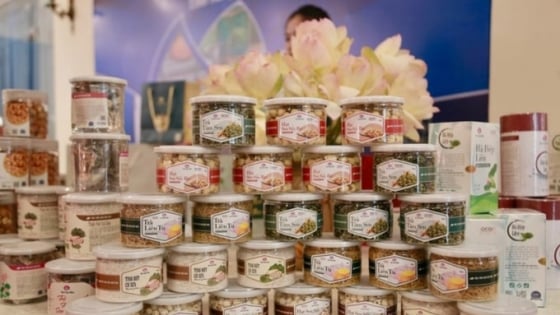(VAN) Nghe An has risen to second place nationwide with 567 certified OCOP products, adorned with glamorous attire but still unable to cast off its burdens.

Deputy Minister of Agriculture and Rural Development Tran Thanh Nam provided close guidance at this workshop. Photo: Ngoc Linh.
On June 27th, the People’s Committee of Nghe An province organized a workshop titled “Developing Value Chain Linkages and Consuming OCOP Products in 2024.” Deputy Minister of Agriculture and Rural Development Tran Thanh Nam attended and provided guidance.
Nghe An, with its vast land, dense population, and favorable soil conditions, is well-suited for agricultural development. Leveraging its natural advantages and successful establishment of concentrated raw material areas, the province has facilitated processing and export activities. Notably, rubber and sugarcane are concentrated in districts like Nghia Dan, Tan Ky, Quy Hop, and Anh Son; tea cultivation is prominent in Thanh Chuong, Anh Son, Con Cuong, Ky Son, and Tuong Duong; while fruit orchards thrive in Quy Hop, Con Cuong, and Nghia Dan districts.
This foundation has significantly supported the vigorous expansion of the “One Commune One Product” (OCOP) program. After six years of implementation, it has yielded fruitful results with 567 certified OCOP products (529 products rated 3 stars, 37 products rated 4 stars, and 1 product rated 5 stars). This achievement positions Nghe An second nationwide, just behind Ha Noi.

Nghe An rank second nationwide in terms of the number of OCOP products. Photo: Ngoc Linh.
A positive aspect of Nghe An is its nurturing of distinctive products through the formation of integrated value chains, awakening local raw material areas linked with geographical indications (such as Vinh oranges, Ky Son ginger, hillside chicken from Thanh Chuong, Vinh Hoa rice, and Dien Chau peanuts). As a result, annual revenue from products rated 3 stars or higher has increased by approximately 8%.
To strengthen and develop these brands, it’s essential to enhance promotional efforts. Nghe An has placed significant emphasis on this aspect in recent years, with evidence showing that 94 OCOP products are present in leading supply chains such as BigC, MM Mega Market, Lotte, Bach Hoa Xanh, Aeon, and Maxi Mart.
Notably, some processed OCOP agricultural products have found stable export markets. For instance, dried tea leaves are popular in Western Asian countries, while fish sauce enjoys good sales in Lao, Japan, and South Korea. Additionally, some products have successfully entered demanding markets like France, Germany, the Netherlands, Sweden, Denmark, the United States, Japan, and South Korea.
Conversely, the OCOP program in Nghe An reveals several challenges and limitations. While there are numerous OCOP-certified products, they often lack depth and haven’t fundamentally established the necessary competitiveness.

The products of Duc Phong Cooperative are highly praised for both their design and quality. Photo: Ngoc Linh.
Many experts agree that Nghe An’s OCOP products are “abundant but not refined.” Most producers operate on a small scale, posing a significant barrier to investment and expanding production to meet commodity standards.
Additionally, the number of cooperatives organizing production and processing activities for specialized products such as “sao hom” (an Indigenous medicinal herb) is sparse. From this, it’s evident that establishing value chain linkages and promoting the consumption of OCOP products will pose considerable challenges for the locality shortly.

Experts assert that Nghe An needs to make a breakthrough for its OCOP products. Photo credit: Ngoc Linh.
Deputy Minister of the Ministry of Agriculture and Rural Development Tran Thanh Nam affirmed, that Nghe An province has achieved some highlights in implementing the OCOP program, as evidenced by the province’s ranking among the top nationwide in the number of OCOP products.
The diverse terrain of Nghe An is divided into 4 distinct regions, and the locality has leveraged this advantage to develop OCOP products associated with the unique characteristics of each region. Interwoven with the achievements are some limitations. Aspects under the authority of the central government and Ministry will be responsible for reporting and advising. Issues under the locality, province, and district must be proactively grasped to find solutions.
“What are OCOP products and what is their value? We must clearly understand the essence to implement it correctly, focusing on the right priorities. The program is a lever for rural economic development, a key component of the new rural development initiative. To achieve sustainable development, it is essential to create a value chain in a “voluntary” manner, where stakeholders need to actively participate, rather than just passively benefiting from policies,” Deputy Minister Tran Thanh Nam provided the direction.
Agriculture News | Agri Products Price



